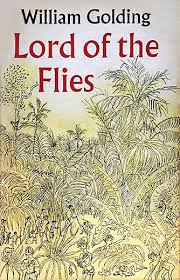Inspiring Older Readers
 posted on 21 Jun 2016
posted on 21 Jun 2016
Fear in the classroom: reading Lord of the Flies
Another in the series of occasional pieces about books that have had an important part in creating my reading identity.
I didn’t have any concept of it at the time but when we were given copies of Lord of the Flies by William Golding to read as part of our English ‘O’ level curriculum back in the late 1960s, we were participating in something of a communal experience. Across the country innumerable children of my age were also opening the book for the first time and plunging into the world of Sam, Eric, Ralph, Piggy and co. and heading off into a journey of neatly controlled and manipulated fear. I have lost count of the number of my peers for whom reading this book remains a seminal memory and towards which they have an almost visceral response when it is mentioned.
For boys of a certain age, this book offers the perfect recipe – protagonists of a similar age to the reader, an exciting adventure, genuine fear, an easy ability to identify with a character and to follow the story from their point of view and a world without adults. I’m not sure any of us at that point went much beneath the surface of the terrifying adventure story to the deeper moral, religious and political messages that provide the story’s superstructure but I am certain that these more subliminal issues have seethed and bubbled around inside us all since then.
It might just be worth recapping the story for anyone who isn’t familiar with the book. Against the backdrop of a nuclear war breaking out, an aeroplane carrying British public school children crashes on an uninhabited island somewhere in the Pacific – no adults survive the crash. The children are forced to organise themselves into something that looks like a civilised community but they soon begin to fall into competing factions vying for power. A lurking fear of the unknown starts to undermine them and they are soon creating imaginary monsters and developing quasi-religious rituals to hold the fear at bay. The group splits between the ‘politicians’ and the ‘hunters’ and soon the hunters become the predators seeking to wipe out anyone who stands against them. Death and terror follow and the last voice of reason is hunted until cornered – and at that moment the bubble is burst by the appearance of an adult rescue party who assume the boys are merely engaged in a game.
Much has been made of the fact that Golding himself was a school teacher and often witnessed the incipient brutality of children towards each other and lamented their savage desire to turn on anyone deemed to be ‘other’. It is certainly true that this is a story about man’s inherent savage inclinations and how, left without a clear moral guardian to oversee their development, human beings default to the lowest common denominator and allow brute force and superstition to overwhelm them but it is much more than that. It’s also about how the veneer of adult sophistication hides this primal instinct in us all – adult life is nothing more than the playing out of the same ‘games’ these children engaged in and the consequences are frighteningly similar – hence the nuclear bomb and the war going on in the ‘real’ world while the events of this book take place in their own bubble. This strips us of any smugness and doesn’t allow us the patronising ability to pass the events off with a comforting cliché or to claim that ‘after all they were only children’ – in this case the child is the father of the man.
We read this book in class – silent reading as I recall – and, without ever admitting it to my friends, I looked forward so much to the moment the book was doled out to us one by one. All week I waited for that exquisite 45 minutes when were sat in our desks unable to talk with anyone but free to silently commune with the collective consciousness of hundreds of our fellow pupils nationwide also running for fear through the jungles of the book pursued by crazed, painted hunters prepared to stick us like pigs. Frightening, thrilling and still with me today.
Terry Potter
June 2016